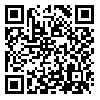Volume 6, Issue 3 (September 2024)
IEEPJ 2024, 6(3): 333-356 |
Back to browse issues page
Download citation:
BibTeX | RIS | EndNote | Medlars | ProCite | Reference Manager | RefWorks
Send citation to:



BibTeX | RIS | EndNote | Medlars | ProCite | Reference Manager | RefWorks
Send citation to:
Pirkamali M A, Momeni Mahmouei H, Mahdipour Y. (2024). The Current Model of Literacy Assessment and Curriculum Evaluation in Elementary School Teachers (Presenting a Model with a Grounded Theory Approach). IEEPJ. 6(3), 333-356. doi:10.22034/6.3.333
URL: http://ieepj.hormozgan.ac.ir/article-1-755-en.html
URL: http://ieepj.hormozgan.ac.ir/article-1-755-en.html
1- Ph.D student in Curriculum Planning, Department of Educational Sciences, Torbat Heydarieh Branch, Islamic Azad University, Torbat Heydarieh, Iran
2- PhD in Curriculum Planning, Department of Educational Sciences, Torbat Heydarieh Branch, Islamic Azad University, Torbat Heydarieh, Iran ,Momenimahmouei@yahoo.com
3- Associate Professor, Faculty of Paramedicine, Health Sciences Research Center, Torbat Heydarieh University of Medical Sciences, Torbat Heydarieh, Khorasan e Razavi, Iran
2- PhD in Curriculum Planning, Department of Educational Sciences, Torbat Heydarieh Branch, Islamic Azad University, Torbat Heydarieh, Iran ,
3- Associate Professor, Faculty of Paramedicine, Health Sciences Research Center, Torbat Heydarieh University of Medical Sciences, Torbat Heydarieh, Khorasan e Razavi, Iran
Abstract: (3013 Views)
Objective: This research investigates the current state of literacy assessment and curriculum evaluation among primary school teachers.
Methods: A qualitative research methodology employing grounded theory was adopted, with the statistical population comprising individuals engaged in elementary school curriculum initiatives, selected through purposive sampling based on predetermined criteria. Data acquisition was facilitated through semi-structured interviews conducted with a cohort of twelve teachers, seven school administrators, and four supervisory figures in primary education. The ensuing data were subjected to analysis via open, axial, and selective coding techniques, with the validation and reliability of the findings being ensured through the application of Lincoln and Guba's criteria.
Results: This study delineated twenty-two principal concepts alongside seven thematic categories, which are articulated within a paradigmatic model. The model encompasses a central theme of consolidating curriculum power and authority within a broader macro context, in addition to causal conditions that encompass factors contributing to educators' limited engagement, expertise, and motivation in the evaluation of curricula, as well as elements pertinent to the curriculum itself. Contextual determinants such as psychological, cultural, and professional factors were also elucidated, along with enabling conditions for intervention, which include a focus on teacher training and professional development in curriculum evaluation, needs assessment, and support mechanisms. Furthermore, constraining conditions for intervention, such as individual impediments, structural obstacles, and economic challenges were identified, in conjunction with strategies aimed at empowering educators in curriculum evaluation, emphasizing individual motivation and cognitive competencies, and fostering networking and professional dialogue regarding curriculum evaluation.
Conclusions: The results establish a foundation for the advocacy of Literacy Assessment among educators and administrators within primary educational institutions, while also yielding significant practical ramifications.
Methods: A qualitative research methodology employing grounded theory was adopted, with the statistical population comprising individuals engaged in elementary school curriculum initiatives, selected through purposive sampling based on predetermined criteria. Data acquisition was facilitated through semi-structured interviews conducted with a cohort of twelve teachers, seven school administrators, and four supervisory figures in primary education. The ensuing data were subjected to analysis via open, axial, and selective coding techniques, with the validation and reliability of the findings being ensured through the application of Lincoln and Guba's criteria.
Results: This study delineated twenty-two principal concepts alongside seven thematic categories, which are articulated within a paradigmatic model. The model encompasses a central theme of consolidating curriculum power and authority within a broader macro context, in addition to causal conditions that encompass factors contributing to educators' limited engagement, expertise, and motivation in the evaluation of curricula, as well as elements pertinent to the curriculum itself. Contextual determinants such as psychological, cultural, and professional factors were also elucidated, along with enabling conditions for intervention, which include a focus on teacher training and professional development in curriculum evaluation, needs assessment, and support mechanisms. Furthermore, constraining conditions for intervention, such as individual impediments, structural obstacles, and economic challenges were identified, in conjunction with strategies aimed at empowering educators in curriculum evaluation, emphasizing individual motivation and cognitive competencies, and fostering networking and professional dialogue regarding curriculum evaluation.
Conclusions: The results establish a foundation for the advocacy of Literacy Assessment among educators and administrators within primary educational institutions, while also yielding significant practical ramifications.
Type of Study: Original |
Subject:
Educational Psychology
Received: 2023/05/14 | Accepted: 2023/08/26 | Published: 2024/09/1
Received: 2023/05/14 | Accepted: 2023/08/26 | Published: 2024/09/1
Send email to the article author
| Rights and permissions | |
 |
This work is licensed under a Creative Commons Attribution-NonCommercial 4.0 International License. |







